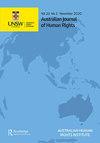当病还不够时——澳大利亚自愿协助死亡法和人权兼容性中预期死亡限制的时间框架
Q1 Arts and Humanities
引用次数: 0
摘要
摘要过去,在澳大利亚所有司法管辖区,即使在他人提出请求并征得其同意的情况下,协助他人结束其生命或夺走他人的生命也会导致刑事责任。因此,无论是医生还是亲属都不能合法地协助某人死亡。自2017年以来,澳大利亚五个司法管辖区出台了《自愿协助死亡法》,允许符合条件的个人在援助下结束生命。在维多利亚州、西澳大利亚州、塔斯马尼亚州、南澳大利亚州和昆士兰州寻求VAD的人必须满足特定的资格要求,包括被诊断患有晚期、渐进性疾病或医疗状况,预计会在6至12个月的特定时间内导致死亡,具体时间取决于司法管辖区。本文以昆士兰为例,分析了死亡限制之前的VAD时间表是否限制了澳大利亚人权立法管辖区的个人人权,并思考了潜在的限制是否合理和合理。文章的结论是,由于这一限制对希望在援助下结束生命的个人产生了严重影响,因此人们对其人权兼容性表示严重关切。本文章由计算机程序翻译,如有差异,请以英文原文为准。
When ill is not ill enough—timeframe until expected death restrictions in Australian Voluntary Assisted Dying laws and human rights compatibility
ABSTRACT In the past, aiding another person in ending their life or taking the life of another, even upon their request and with their consent, gave rise to criminal liability in all Australian jurisdictions. Consequently, neither doctors nor relatives could lawfully assist someone in dying. Since 2017, five Australian jurisdictions have introduced Voluntary Assisted Dying (‘VAD’) Acts allowing eligible individuals to end their lives with assistance. A person seeking access to VAD in Victoria, Western Australia, Tasmania, South Australia and Queensland must meet specific eligibility requirements including be diagnosed with a disease, illness or medical condition which is advanced, progressive and is expected to cause death within a specific timeframe ranging from six to 12 months depending on the jurisdiction. Using Queensland as an exemplar, this article analyses whether the VAD timeframe until death restriction limits individual human rights in Australian jurisdictions with human rights legislation and contemplates whether potential limitations are reasonable and justified. The article concludes that due to its severe impact on individuals wishing to end their life with assistance, the restriction is raising severe concerns about its human rights compatibility.
求助全文
通过发布文献求助,成功后即可免费获取论文全文。
去求助
来源期刊

Australian Journal of Human Rights
Arts and Humanities-History
CiteScore
1.30
自引率
0.00%
发文量
43
期刊介绍:
The Australian Journal of Human Rights (AJHR) is Australia’s first peer reviewed journal devoted exclusively to human rights development in Australia, the Asia-Pacific region and internationally. The journal aims to raise awareness of human rights issues in Australia and the Asia-Pacific region by providing a forum for scholarship and discussion. The AJHR examines legal aspects of human rights, along with associated philosophical, historical, economic and political considerations, across a range of issues, including aboriginal ownership of land, racial discrimination and vilification, human rights in the criminal justice system, children’s rights, homelessness, immigration, asylum and detention, corporate accountability, disability standards and free speech.
 求助内容:
求助内容: 应助结果提醒方式:
应助结果提醒方式:


